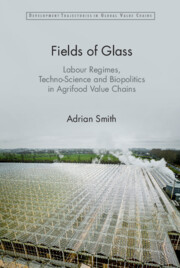Refine search
Actions for selected content:
3 results
4 - The Dynamics of the Glasshouse Agrifood Value Chain
-
- Book:
- Fields of Glass
- Published online:
- 16 June 2025
- Print publication:
- 19 June 2025, pp 65-93
-
- Chapter
- Export citation
1 - Food Security and the ‘Total Ecology’ of Glasshouse Agrifood Value Chains
-
- Book:
- Fields of Glass
- Published online:
- 16 June 2025
- Print publication:
- 19 June 2025, pp 1-14
-
- Chapter
-
- You have access
- HTML
- Export citation

Fields of Glass
- Labour Regimes, Techno-Science and Biopolitics in Agrifood Value Chains
-
- Published online:
- 16 June 2025
- Print publication:
- 19 June 2025
